Pro-China messaging amplified in Venezuela’s “hashtag of the day”
Hashtag trended on Venezuelan Twitter alongside messages praising China for donating its vaccine and attacking US for sanctions.
Pro-China messaging amplified in Venezuela’s “hashtag of the day”
Share this story
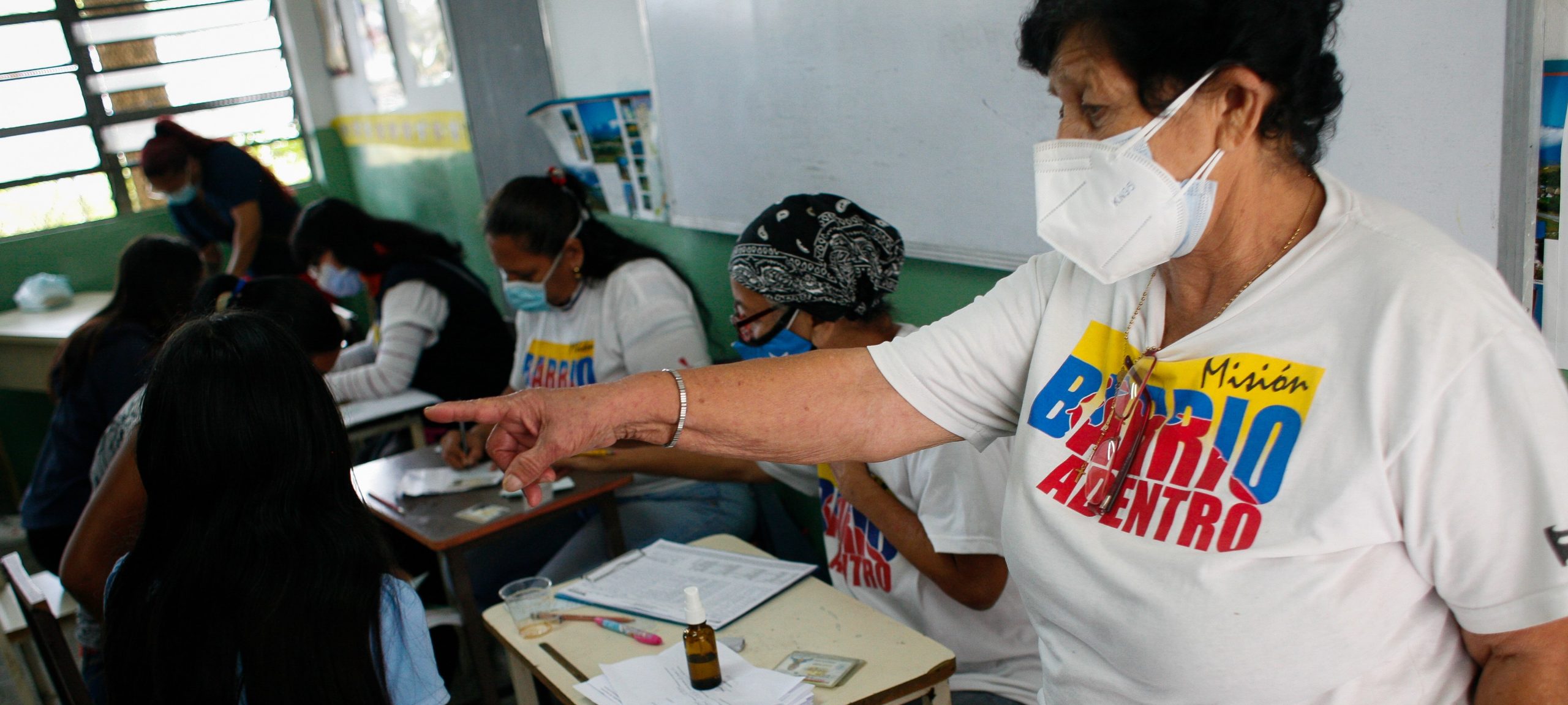
BANNER: A health worker gestures during a day of immunization against Covid-19 with the compound manufactured in China Sinopharm aimed at high school students at a high school in the west of the city, in Caracas, Venezuela, October 29, 2021. (Source: Javier Campos/NurPhoto via Reuters)
In March 2021, pro-China messaging dominated Venezuelan Twitter around use of the hashtag #VacunaEsperanzayVida (“#VaccineHopeAndLife”), which trended thanks to the Nicolás Maduro regime’s promotion as a part of its “hashtag of the day” campaigns.
Venezuela plays an important role in China’s diplomatic efforts both in Latin America and on the broader international stage. China sees the Maduro regime as a valuable vector to help foster consensus for China’s model of international relations and to bolster its narratives of the United States as an unworthy global leader. It is also representative of their sometimes mutually beneficial relationship: by leveraging its soft power, China receives a messaging boost from Venezuela as it pointedly proclaims its praise in public, while Venezuela gets to stick its thumb in the eye of the United States.
The below case study illustrates how Twitter accounts connected to the Venezuelan state or affiliated with its supporters spread narratives favorable to both China and the Maduro regime on Venezuelan social media while attacking the United States and its allies in the country. The DFRLab focused on China’s March 2021 vaccine diplomacy in Venezuela as a starting point to examine these trends. The pro-Maduro effort used China-style social control program to reward citizens that inauthentically amplified Maduro’s propaganda on Twitter’s Venezuela.
The Maduro regime’s amplification of China’s vaccine diplomacy
After China delivered 500,000 doses of its vaccine Sinopharm to Venezuela on March 1, 2021, Twitter accounts belonging to Maduro regime supporters, high-ranking officials, and Maduro himself expressed gratitude and praise for Chinese President Xi Jinping’s help fighting the pandemic in Venezuela. The accounts also blamed “the blockade” of Venezuelan immunization efforts due to the economic sanctions imposed by the United States on Maduro and high-ranking regime officials.
Accounts belonging to the Maduro regime, including some displaying bot-like features and inauthentic behavior, amplified #VacunaEsperanzayVida (#VaccineHopeAndLife) as a hashtag for the regime’s Etiqueta del Día (“hashtag of the day”) campaign, which it uses on an almost daily basis to manipulate Twitter’s trending topics and portray messages containing pro-Maduro hashtags as more popular than they actually are.
Taking advantage of Venezuela’s dire economic situation to secure the support of its citizens, the regime relies on Sistema Patria (Fatherland System), a social program that uses smart-card ID known as the “Carnet de la Patria” (Fatherland Card), which Chinese state-controlled company ZTE helped establish. When using their Twitter accounts to amplify hashtags of the day, Venezuelans have access to rewards and payments through “bonuses” paid to their smart card.
Although there have been other reports on the Maduro regime’s efforts to praise its allies on Venezuelan Twitter during the pandemic while attacking the United States, sometimes in joint operations, the DFRLab did not identify accounts linked to the Chinese government as engaging with or amplifying #VacunaEsperanzayVida.
An inauthentic campaign to praise China and attack the US
Before midnight on March 1, 2021, Maduro posted a picture on Twitter showing a Conviasa commerical jet after it landed supposedly carrying doses of the recently approved Chinese vaccine Sinopharm. In the tweet, Maduro announced that a mass vaccination plan would soon start in Venezuela. In a follow-up tweet, Maduro thanked Xi and the Chinese people for their “cooperation and solidarity.”
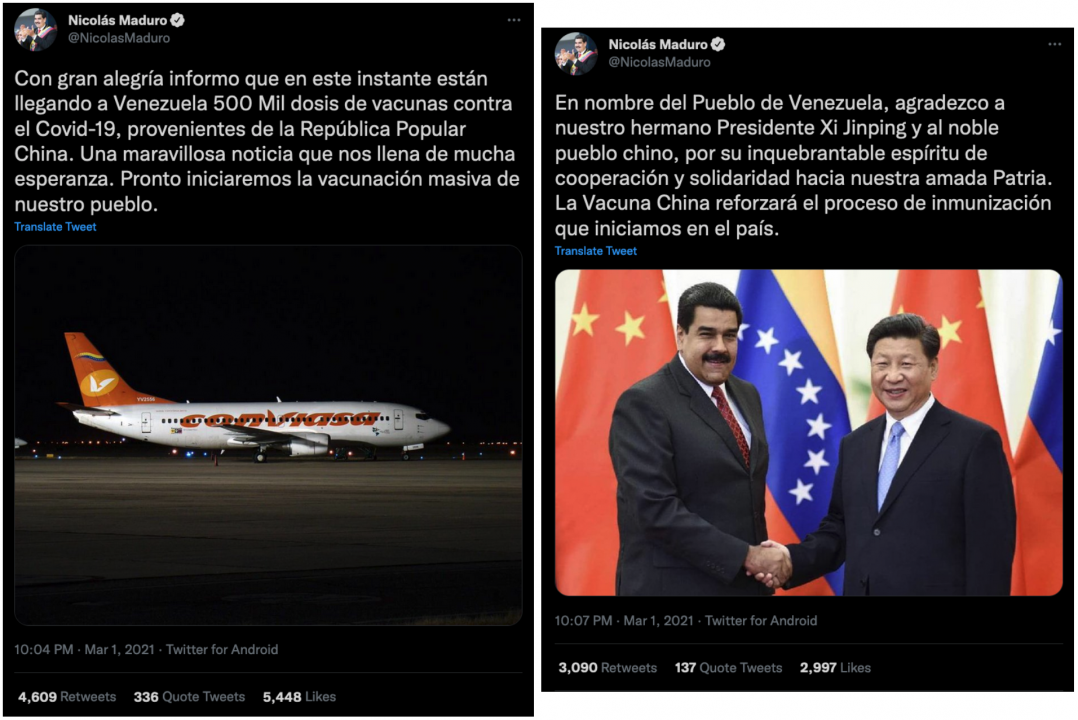
Accounts belonging to Maduro regime-controlled institutions and media outlets shared videos and pictures of the vaccines being unloaded at Maiquetía International Airport.
According to a search using social media listening tool Meltwater Explore, the account @anitamontagne2 posted the first tweet to use #VacunaEsperanzayVida on March 1, 2021, at 10:38 p.m. local time. @anitamontagne2 appears to be operated by a pro-Maduro photographer who has been denounced for harassing journalists on social media who are not aligned with Maduro, as well as civil organizations promoting freedom of expression. In the tweet, @anitamontange2 quoted Maduro’s first post about the arrival of the vaccines, hailing it as “excellent news.”
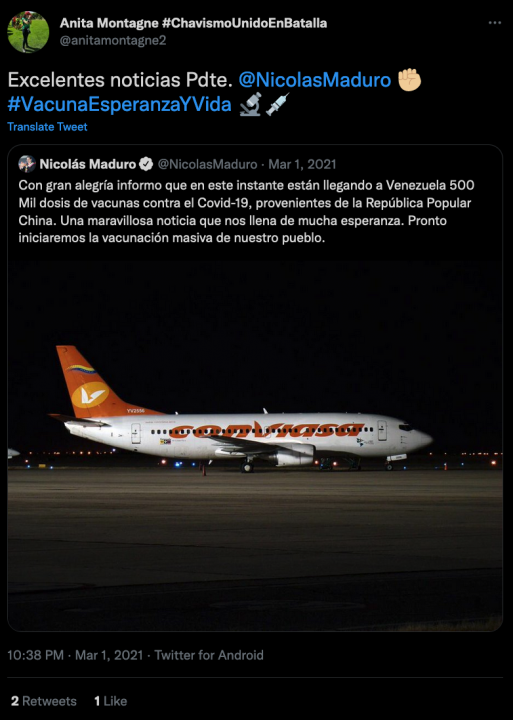
After @anitamontagne2’s post, pro-Maduro and regime-controlled accounts used #VacunaEsperanzayVida alongside posts about news and official statements following the Chinese donation.
Later, on March 2 at 6:04 a.m., @Mippcivzla, the account for Maduro’s Ministry of Communications posted and promoted #VacunaEsperanzayVida as the official hashtag of the day.
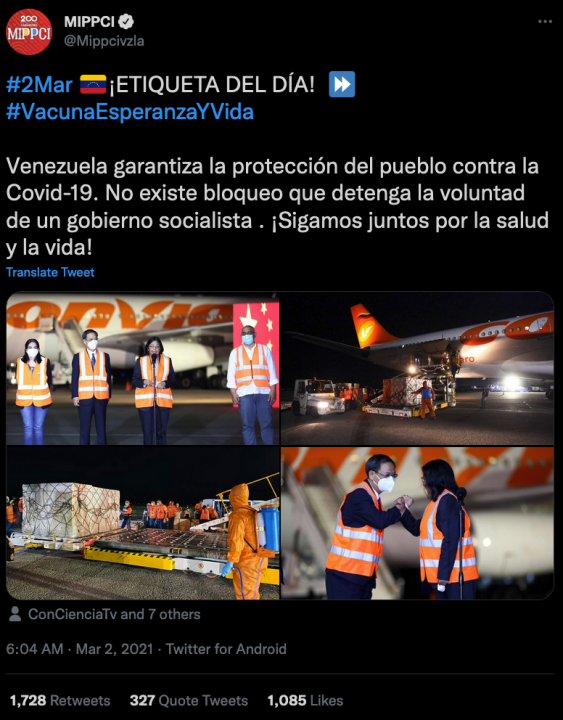
Immediately following @Mippcivzla’s post, the hashtag took off as its usage multiplied. While the hashtag had garnered 6,241 mentions prior that post, mentions almost tripled during the first hour afterwards, appearing in 15,565 posts.
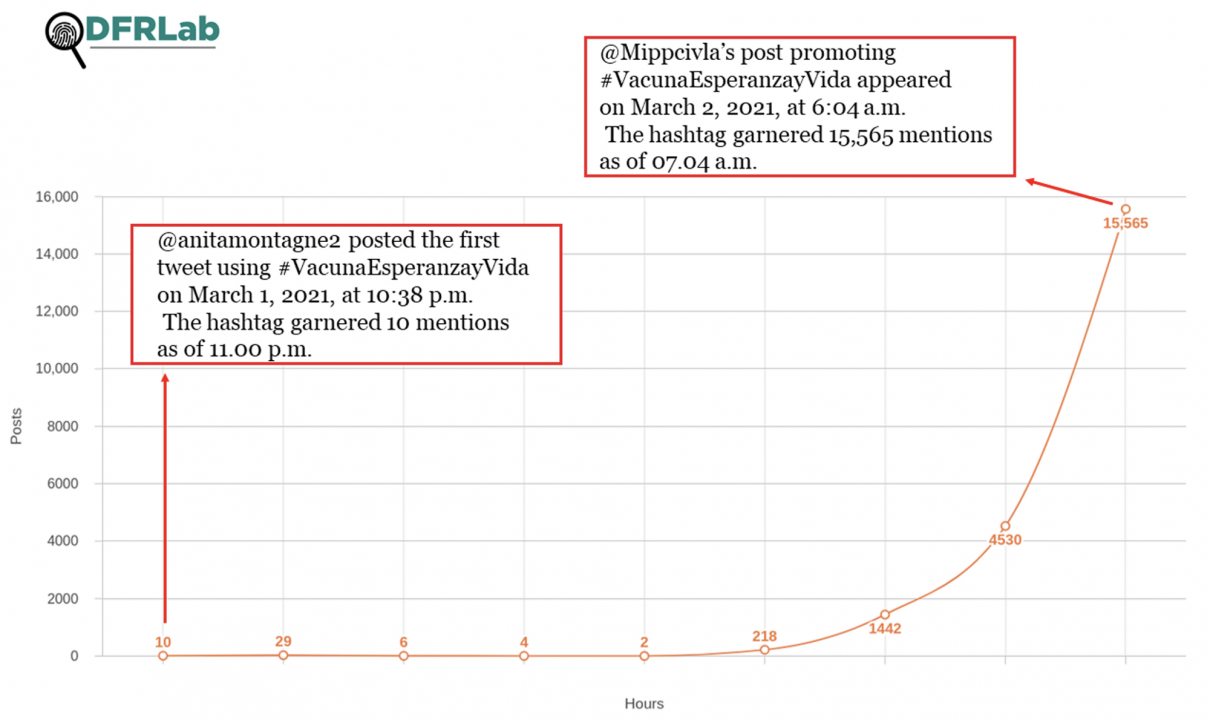
An analysis of the seven hours leading up to @Mippcivla’s tweet and the hour following it showed multiple indicators of inauthentic behavior. Many of the most active accounts have since been suspended, while others showed bot-like features or actively engaged in amplifying pro-Maduro propaganda.
Over the seven hours leading up to the @Mippcivla tweet, accounts posted #VacunaEsperanzayVida in 5,388 retweets, 419 quote tweets, 13 replies, and 421 original tweets; retweets and quotes comprised 92 percent of all mentions. In the hour following the tweet, the hashtag garnered 13,428 retweets, 1,054 quote tweets, 170 replies, and 913 original tweets; retweets and quotes made up 93 percent of all mentions. According to the CTM (Coefficient of Traffic Manipulation) method of measuring inauthentic behavior, along with previous monitoring analyzing Venezuela’s Twitter behavior, a retweet/quote to original tweet ratio of over 85 percent during both timeframes is an indicator of traffic manipulation.
As shown in the tables below, the 20 most-active accounts in both timeframes posted the hashtag between 94 and 288 times. Twitter has since suspended 13 of these accounts.
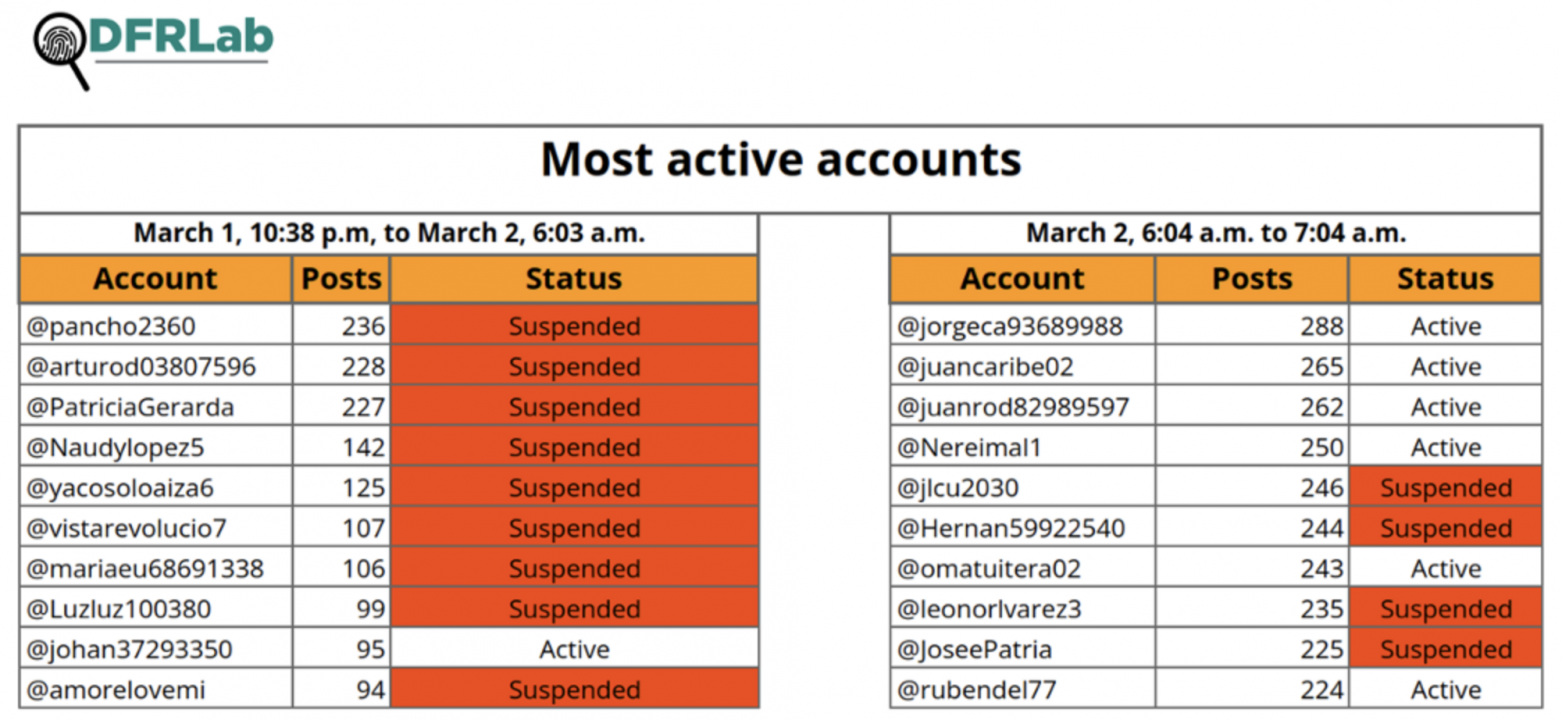
Anti-US sentiment and other propaganda narratives
According to trending Twitter topic monitor tool Get Day Trends, the hashtag was the top trending topic on Twitter’s Venezuela on March 2 and March 3. After March 3, the activity around the hashtag swiftly decreased, lending more credence to the belief that that the hashtag was a campaign motivated by the news cycle about China’s donation. As of January 4, 2022, it had received 501,529 mentions, of which 419,827 of them were comprised of retweets, quotes, and replies, representing 83 percent of all mentions.
Of all the accounts that amplified the hashtag between March 1, 2021, and January 4, 2022, the most retweeted were @Mippcivla, the Ministry of Communications account, and that of the Fatherland Card, @CarnetDLaPatria. @Mippcivzla’s first post promoting #VacunaEsperanzayVida on March 2 was the most retweeted. Other posts by @Mippcivzla amplified additional anti-US narratives by claiming that the Chinese donations were a victory over the United States and its allies that support sanctions against Maduro.
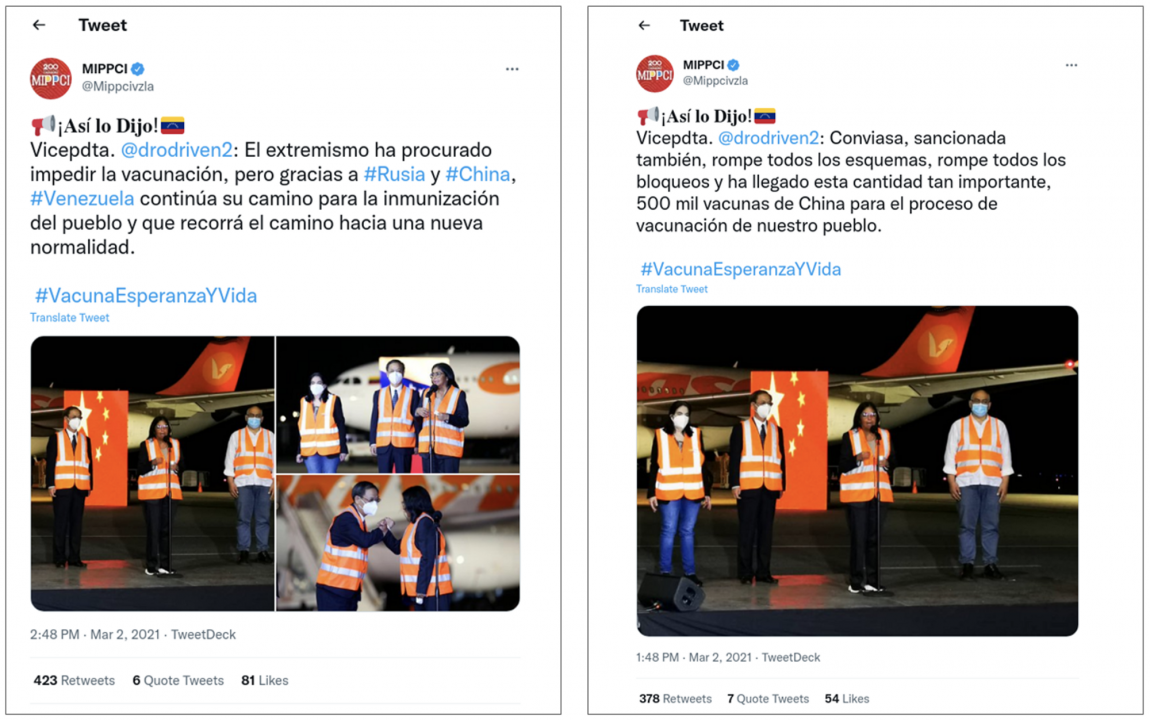
According to a search using Meltwater Explore, an additional 5,103 accounts used #VenezuelaEsperanzaYVida alongside keywords relating to the US sanctions in 24,000 posts. Among the most retweeted accounts were Maduro supporters, pro-Maduro social influencers, and Maduro party members. Accounts belonging to regime-controlled TV station VTV and the Ministry of Habitat and Housing also used the hashtag, but only to amplify the narrative against the sanctions rather than the Chinese donation or vaccination campaign.
Immediately behind @Mippcivzla’s post in terms of the most mentions of #VacunaEsperanzayVida were eight posts from @CarnetDLaPatria. The account’s top three tweets promoted the payment of bonuses and amplified Maduro’s statements propagandizing the social control program. None of them, however, mentioned China’s vaccine donation. Nonetheless, @CarnetDLaPatria’s fourth highest post announced the arrival of the Sinopharm shipment.
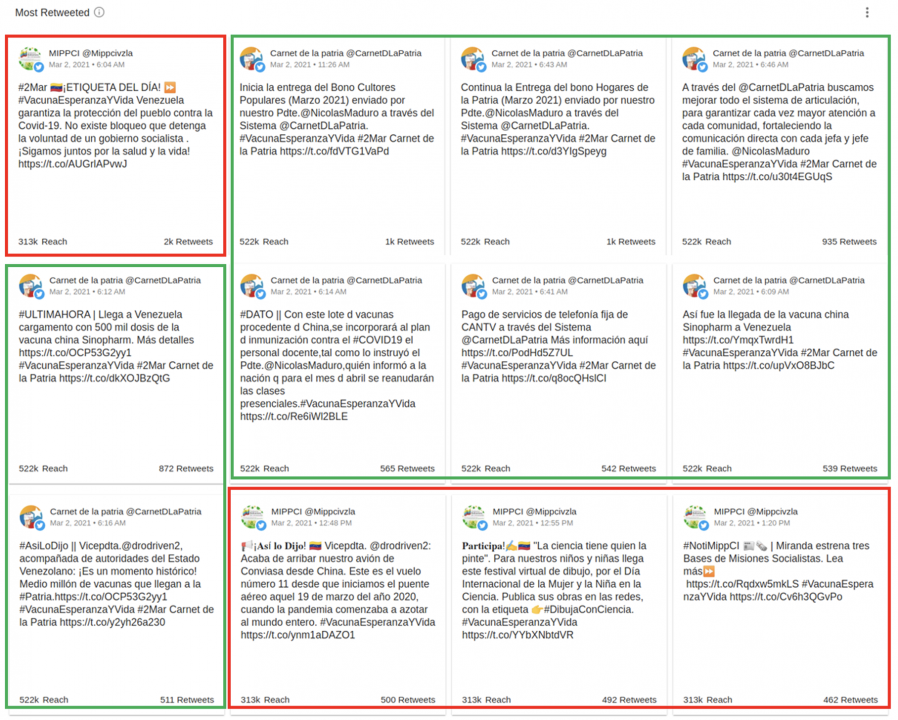
Chinese state media efforts
Accounts linked to the Chinese government did not participate in the hashtag campaign. Although @MIPPCIvzla tagged the accounts of the Chinese Embassy in Venezuela and Ambassador Li Baorong on March 2, the DFRLab did not find evidence of them interacting with posts amplifying the campaign. In contrast, Chinese Spanish-language state media actively spread similar narratives among audiences across Latin America. In a discourse analysis of approximately 100 state media articles over the course of 2021, the DFRLab found that China’s Spanish-language official media focused on positive coverage of the Maduro regime.
Xinhua Español, China’s official Spanish-language state media outlet, primarily targets audiences in Latin America. While its coverage of Venezuela emphasized how US sanctions impacted Venezuela’s ability to combat the pandemic, a large proportion of it also focused on the regime’s successes in containing the spread of COVID-19, including its nationwide vaccination program. This coverage differed from how Xinhua Español reported on outbreaks in pro-US countries, including Colombia. There, coverage has emphasized the number of new COVID cases and its spread.
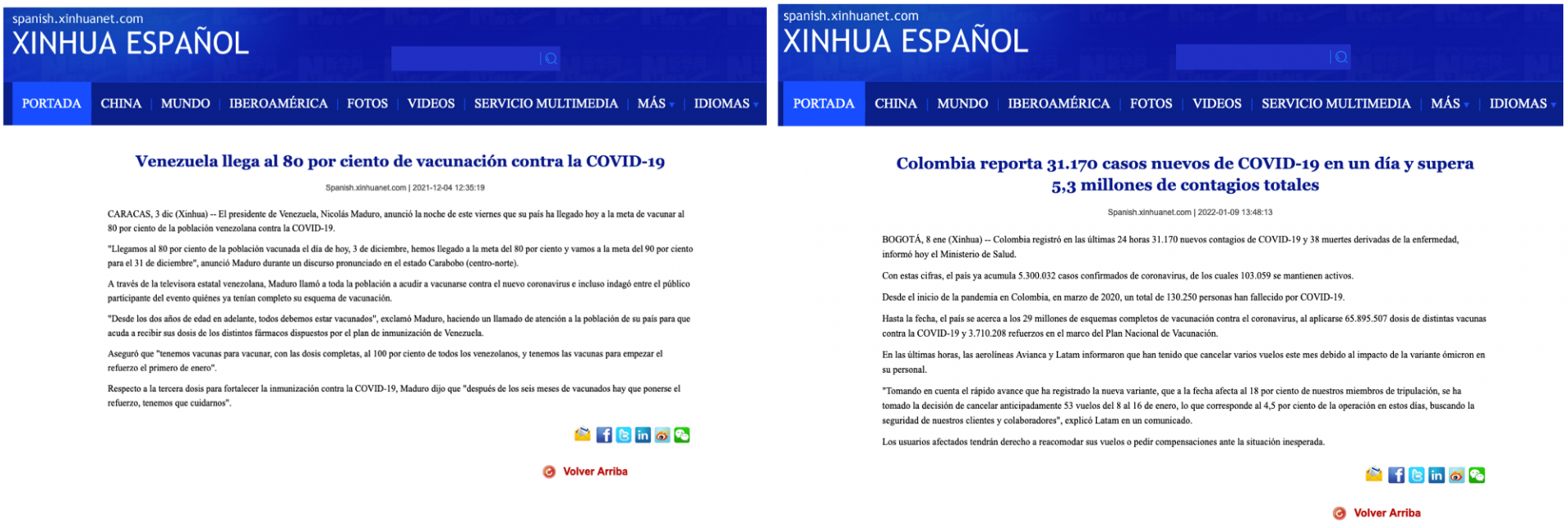
The above findings highlight the complementarity of the Maduro regime’s social media efforts with those of China’s state media in the region. Both media strategies worked to spread narratives favorable to both China and Maduro on Venezuelan social media while attacking the United States and its allies in the region.
Cite this case study:
Daniel Suárez Pérez and Kenton Thibaut, “Pro-China messaging amplified in Venezuela’s ‘hashtag of the day,’”, Digital Forensic Research Lab, January 26, 2022, https://medium.com/dfrlab/pro-china-messaging-amplified-in-venezuelas-hashtag-of-the-day-2f6bc704264.

